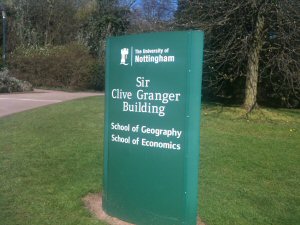
August 24, 2012, by Matt
Day in the life of a Geographer … John Pearson
It is with great pleasure that we welcome Nottingham Geography alumni John Pearson to the Geog Blog, with his first contribution found below…
“As this is my first blog entry, I should start with a bit of an introduction. I am a former Geography student from Nottingham, although my studies seem a long time ago now. I graduated in the summer of 1990 – I fondly remember the period between finishing my final exams and getting my results, when all I had to do was watch the World Cup in Italy! I have a vivid memory of watching England vs Belgium in the University Bar, which exploded in plastic beer glasses when David Platt (then of Aston Villa, the team I support), scored in the last minute of extra time. The bar manager then switched off the TV until “we all sat down and behaved” – which not surprisingly didn’t take long! It was a lot of fun watching the England team that summer, until it all ended in defeat on penalties. So some things don’t change…
When I left Nottingham I joined the Foreign Office, and am still there – 22 years on. I have worked at the main Foreign Office in London, and as a diplomat in Madrid, Brasilia, Montevideo and now Singapore. My current job is to take forward the British Government’s work on climate change in South East Asia. We are mainly looking to do two things – work with countries of the region to agree an international deal on climate change, and to promote the benefits of moving to a “low carbon” economy with less dependence on fossil fuels.
When I arrived in the region I thought: “The first thing is to work out what are the main climate change issues here – what are the angles that really concern people?” There are a number – forestry is key, with significant emissions particularly from peatland areas, and plenty of interest in the carbon markets. But the one argument I heard everywhere was ‘Our countries are going to develop economically – we won’t sacrifice growth on the altar of low carbon’. So it was clear we had to show how taking action on climate change wouldn’t damage economies – and would actually be the most sustainable way forward.
There were some misunderstandings to overcome – NGOs told me of comments like ‘You green activists, you want us all to go back to riding on bullock carts!’ – by people who should have known better. So we needed to find good evidence – hard facts and figures – to demonstrate you really wouldn’t have to ride a bullock cart in a low carbon world (unless you wanted to, of course).
Thankfully that evidence exists. The UK supported the Asian Development Bank to produce a report looking at the economics of climate change in South East Asia. It makes stark reading. The ADB concludes that South East Asia is very vulnerable – as so much of its population and economic activity is found in low lying coastal areas, and natural resources form a major part of the economy. The estimated GDP loss from climate change is 6.7% each year by 2100 – over TWICE the global average. And rice yield could be reduced by 50% by 2100.
But there is good news as well. The report identifies excellent opportunities to reduce emissions at low or negative cost. For the energy sector, 40% of emissions could be cut at negative cost by 2020 – that is, improving energy efficiency will reduce energy bills, save money and cut emissions at the same time.
The ADB report is a very good document – I would recommend it to anybody interested in how climate change is going to affect Asia, the most dynamic and fastest growing region on earth. “
No comments yet, fill out a comment to be the first

Leave a Reply